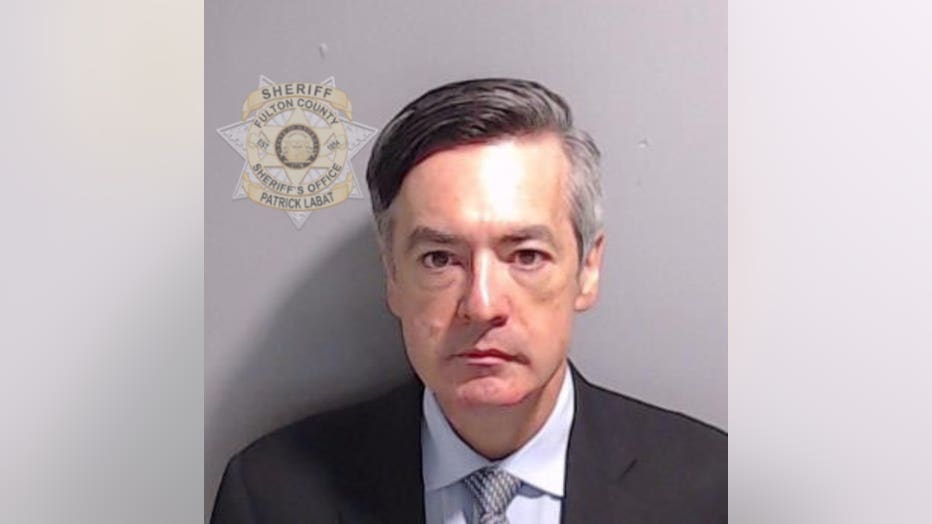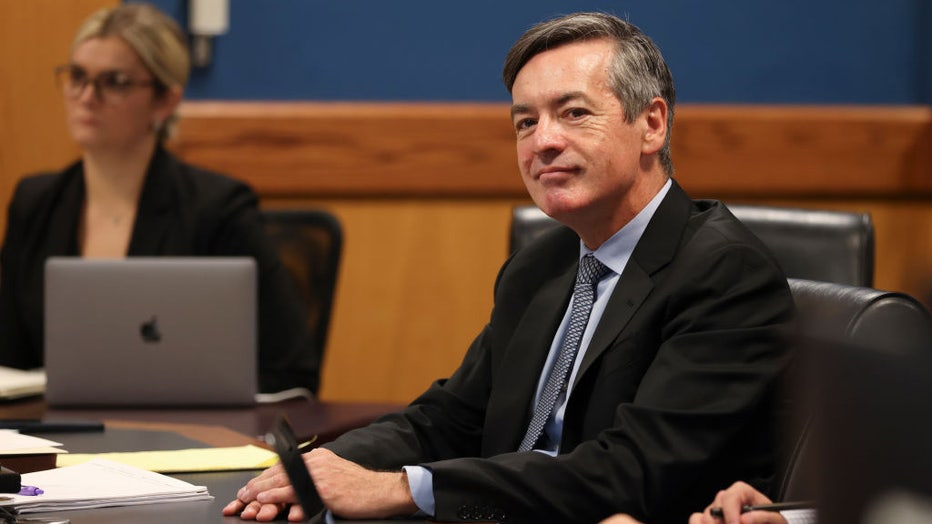Trump co-defendant Kenneth Chesebro pleads guilty in Georgia election interference trial
Trump co-defendant Chesebro pleads guilty
Lawyer Kenneth Chesebro, one of the 19 defendants in Georgia's election interference case against former President Donald Trump and his allies, has become the third defendant to plead guilty just before his case was set to go on trial.
FULTON COUNTY, Ga. - Lawyer Kenneth Chesebro, one of the 19 defendants in Georgia's election interference case against former President Donald Trump and his allies, has become the third defendant to plead guilty just before his case was set to go on trial.
Chesebro pled guilty to his efforts to use fake electors to change the results of the election. District Attorney Fani Willis says he was the man behind it, but Chesebro’s attorney disagrees.
"I think this plea deal absolutely shows and proves that he was not and never was the architect of any sort of fake elector plan," said Scott Grubman, Kenneth Chesebro’s Attorney.
According to the negotiated terms, Chesebro will receive 5 years of probation; pay $5,000 restitution; complete 100 hours of community service; write an apology letter; and testify as needed against former President Trump and the remaining defendants.
"The plea agreement says that if he's called, he'll testify, and he's a man of his word," Grubmans said. "What this does for Mr. Chesebro is it guarantees he goes home, He doesn't spend a minute in jail, and he can hopefully continue to practice law."
Jury selection began Friday for Chesbro's trial, which would have been the first trial in the Georgia case accusing Trump and others of illegally scheming to overturn the 2020 election in the state. Shortly after potential jurors were sworn in and given a questionnaire, Chesebro and his team appeared in Judge Scott McAfee's courtroom to enter a plea.
Chesebro was indicted just over two months ago along with Trump and 17 others. Two of those others - including Sidney Powell, who was supposed to go on trial with Chesebro - have already pleaded guilty to reduced charges, and no trial date has been set yet for the rest.
If Chesebro didn't take a plea deal before the trial starts, the proceedings would have provided a first extensive look at the evidence that Fulton County District Attorney Fani Willis and her team have amassed against him and the rest of the defendants.
Powell pleads guilty | What that could mean for Trump
Sidney Powell, the former attorney for Donald Trump accused of trying to illegally overturn the 2020 election in Georgia, pleaded guilty to reduced charges a day before her trial was set to begin. Experts weigh in on what this latest development could mean for the former president.
ABC News reports that the lawyer rejected an earlier deal offer in which he would plead guilty to a single felony racketeering charge and agree to testify against other co-defendants.
Until Friday morning, Chesebro was set to go on trial alongside Powell after each filed a demand for a speedy trial. Under Georgia law, a defendant who files a demand for a speedy trial has a right to have a trial begin within the court term when the demand is filed or in the next court term. That meant the trial had to start by Nov. 5.
Powell agreed to a deal with prosecutors, pleading guilty to six misdemeanor counts. As part of the deal, she must testify truthfully if she is called as a witness at any future trials related to the case.
She was also sentenced to probation and ordered to pay a fine.

Kenneth Chesebro (Fulton County Sheriff's Office)
What Chesebro was accused of
All the defendants are accused of violating Georgia's Racketeer Influenced and Corrupt Organizations Act, known as RICO, by participating in a wide-ranging scheme to keep Trump in power despite his election loss.
Chesebro is also accused of working on the coordination and execution of a plan to have 16 Georgia Republicans sign a certificate declaring falsely that Trump won and declaring themselves the state's "duly elected and qualified" electors.
The indictment says Chesebro wrote memos outlining that plan, including one that "provides detailed, state-specific instructions" for how Trump elector nominees in swing states where Trump had lost could meet to cast votes for Trump on Dec. 14, 2020.
In an email sent a few days before those meetings were to happen, Chesebro wrote that "the purpose of having the electoral votes sent in to Congress is to provide the opportunity to debate the election irregularities in Congress and to keep alive the possibility that votes could be flipped to Trump."
In an email to former New York Mayor Rudy Giuliani, he outlined strategies to disrupt and delay the joint session of Congress on Jan. 6, 2021, during which electoral votes were to be certified, prosecutors said. He wrote that those strategies were "preferable to allowing the Electoral Count Act to operate by its terms."
In addition to the racketeering charge, he faces six felony conspiracy counts related to the elector plan.

Kenneth Chesebro, a lawyer who worked in connection with former U.S. President Donald Trumps 2020 re-election campaign, appears before Judge Scott McAfee in a hearing related to the 2020 election interference case on October 10, 2023 in Fulton County
Chesebro's defense
Chesebro's attorneys do not dispute that he drafted the legal memos and emails at issue, but they have said every action he took was justified under Georgia and federal law. He is a constitutional law expert who was working as a lawyer to research and find precedents to support a legal opinion that he provided to the Trump campaign, they argued in court filings.
"Nothing about Mr. Chesebro's conduct falls outside the bounds of what lawyers do on a daily basis; researching the law in order to find solutions that address their clients' particularized needs," they wrote in one filing.
GA Trump Indictment: What is a RICO charge?
While former President Donald Trump and 18 of his allies all face multiple charges in the Fulton County grand jury's indictment, the most serious count is the only one they all share: violation of the Georgia Racketeer Influenced and Corrupt Organizations Act. FOX 5 took a look at the seriousness of that charge and how much experience District Attorney Fani Willis has with it.
His lawyers tried to get the judge to bar prosecutors from using Chesebro's memos and emails at trial, arguing that they were protected by attorney-client privilege and the work product doctrine. But the judge rejected those arguments.
The Associated Press contributed to this report.

